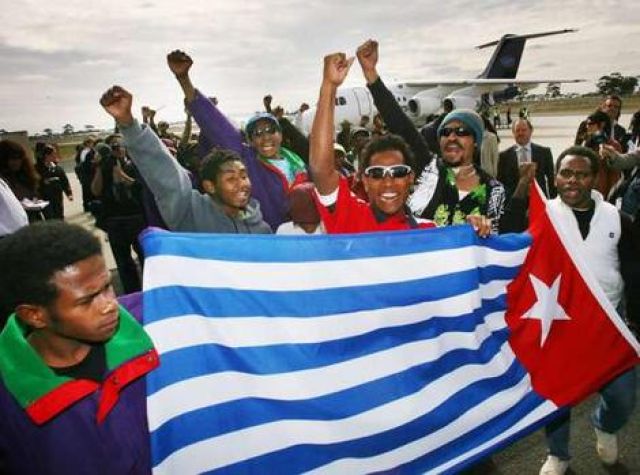
Hearings began last month into the case of five West Papuan independence leaders on trial for treason. They were arrested with hundreds of others when Indonesian troops attacked the Papuan People's Congress on October 19 last year.
The conference had declared the Indonesian-occupied territory an independent state. West Papua was officially annexed by Indonesia's Suharto dictatorship in 1969 in a United Nations-supervised “act of free choice”, in which only 1022 Papuans were allowed to vote.
The defendants, Forkorus Yaboisembut, Edison Waromi, Dominikus Surabut, Selpius Bobii and Agust Kraar, were targeted for their role as prominent figures in the independence movement. Yaboisembut was named president of West Papua at the congress and Waromi was named prime minister.
The five face a life sentence if convicted of treason, the Jakarta Post said on February 29.
A March report from the East Timor and Indonesia Action Network said the trial was “lurching toward a juridical farce”. Many of the prosecution's witnesses were unable to answer questions about the defendants' role in the congress. Some appeared unaware of the declaration of independence.
The trial has been marked by attempts to intimidate the defendants and their legal team. The defendants and many others say they were tortured after their arrest in October.
The police have maintained a heavy presence at the trial. West Papua Media said on February 25 that security forces had been out in force during the hearings, setting up camps outside the courthouse, guarding the streets nearby and harassing supporters who tried to enter the court.
Yoab Syatfle, an assistant to Yaboisembut, said in a February 21 email that the defendants were threatened during a late night meeting by the Jayapura police chief, his deputy and the head of the prison. The officials warned they could be transferred to other jails throughout Indonesia if they did not behave during court proceedings.
WPM said on February 20 that heavily armed police stormed the prison cells of the defendants and other political prisoners and confiscated all personal items.
Bintang Papua said on March 1 that prosecutors threatened to report defence lawyer Gustaf Kawar to police for “inappropriate behaviour” during the trial. Kawar had allegedly shouted at the prosecutor when the prosecutor tried to interfere with the cross-examination of police witnesses.
Despite the intimidation, the defendants have used the trial to further the independence campaign. The defendants released a statement on January 30 rejecting the treason charges and asserting their rights as citizens of a sovereign nation.
“No one, for whatever reason, has the right to make accusations against us or to convict us in a treason trial or any such trial,” the statement said. “This is because we have become the subjects of our own laws as citizens of the nation and state of the Federal Republic of West Papua.”
The defendants held a press conference on February 8 at which they criticised the charges against them and the heavy police presence at the trial. Supporters unfurled banners and chanted “Papua Merdeka [freedom]”.
Jubi reported on March 2 Yaboisembut said in court that the “Federal Republic of West Papua” had been registered with the UN Security Council to gain international recognition.
The prosecutions come after several years of growth of the independence movement and increased international attention on West Papua.
Papuans have campaigned for independence since Indonesia took over in 1963 after the withdrawal of former colonial ruler the Netherlands. Indonesia's occupation of West Papua has been rife with human rights abuses and large-scale exploitation of people and the environment.
Thousands rallied on February 20 in cities across West Papua against Indonesia's attempts to revive the failed “special autonomy” system.
Special autonomy was introduced in West Papua by the Indonesian government in 2001 in an attempt to curb the independence movement. Despite promises of improved access to services and greater democratic input for Papuans, the system created only token bodies that led to little improvement.
The protests rejected a new body called Program to Accelerate Development of Papua and West Papua. This was imposed by the Indonesian government to restart the special autonomy system, despite years of protests by Papuans calling for it to be scrapped.
Protesters in Jayapura chanted “we want a referendum”, “special autonomy has failed, why start it again?” and “we reject the dialogue between Jakarta and Papua and demand a referendum”, WPM said on February 22.
A protest rejecting special autonomy was held in Fak-Fak on March 1, WPM said the next day. Ten people were arrested.
The Fak-Fak rally and others around West Papua also supported the formation of the Australia-Pacific chapter of International Parliamentarians for West Papua (IPWP), which held its first meeting in Canberra on February 28.
IPWP was formed in 2008 in London as part of the international solidarity campaign with West Papua.
The Canberra meeting was organised by the Australian Greens, and hosted MPs from Australia, Vanuatu and New Zealand.
Several ALP MPs attended in defiance of a directive from acting foreign affairs minister Craig Emerson to avoid the meeting, ABC's PM said on February 28.
The ALP officially opposes West Papuan independence. In government, it has continued the funding and training of Indonesian military units that brutally repress Papuans and other oppressed groups across Indonesia.
